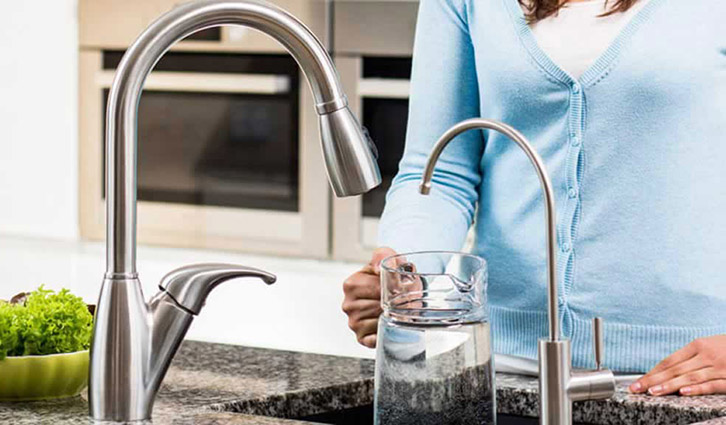Residential water treatment devices

Home water treatment: what is it?
Home water treatment is just what it sounds like — water treated by a homeowner, using a privately purchased and maintained system. Homeowners have the option to install a point-of-use water-treatment device for all or specific areas of the indoor plumbing. Point-of-use water treatment systems may include water softeners, water conditioners, reverse osmosis systems, or multiple-stage filters.
As water treatment system users, homeowners are responsible for the cost, maintenance, service and safety of their device, and the quality of the water the device produces.
Frequently asked questions
Q: Can I drink the water IRWD provides?
A: Yes. IRWD treats drinking water to the Safe Drinking Water Act, Code of Federal Regulation set by the United States Environmental Protection Agency and the Division of Drinking Water, regulated by the State Water Resources Control Board. Through these strict reporting and regulatory compliance codes, IRWD prides itself on providing high-quality drinking water in an efficient, cost-effective, and environmentally sensitive manner.
Q: Why do people install home water treatment devices?
A: A treatment system or a filter may improve the aesthetic qualities of water, such as taste, odor or color.
Q: Are there regulations for installing these treatment devices?
A: The California Health and Safety Code requires that all softening or conditioning devices:
- • Be installed with an appliance that activates regeneration by demand control.
- • Include installation of conservation devices on all fixtures using softened or conditioned water such as: faucet flow restrictors, shower head restrictors, and high-efficiency toilets.
- • Include installation of a separate piping system so that treated (softened or conditioned) water is not carried to the outside of the house.
- • Have a salt-efficiency rating of no less than 4,000 grains of hardness removed per pound of salt during regeneration, for self-regenerating water softeners.
Q: Are water softeners allowed in the Irvine Ranch Water District service area?
A: IRWD prohibits the use of self-regenerating water softeners — the kind that require rock salt, potassium or other material to be added periodically by the owner. The reason is simple: IRWD recycles its sewage and the salty brine discharged by self-regenerating water softeners is not removed during the recycling process. Salt used in self-regenerating water softeners can affect salinity levels of recycled water used to water plants and trees on public and commercial land in our service area — including parks, medians, college campuses, golf courses, and homeowners association properties. For more information, please refer to the IRWD Rules and Regulations Section 7.3.3 or the California Health and Safety Code requirements for water treatment systems.
Q: What can I use besides a self-regenerating water softener?
A: There is an environmentally friendly option. If you desire soft water in your home, we encourage you to subscribe to a water softener service that picks up and exchanges the cylinder so the salt does not go down the drain. We also encourage the use of a salt-free water treatment system. The Los Angeles County Sanitation Districts have made an informational website comparing multiple salt-free treatment devices for your reference. Please visit lacsd.org for more information.
Q: Should I use a filter? What kind should I use? How often should it be changed?
A: Filters are a matter of personal choice. Most people who have them use them to filter out residual chlorine taste. Various filters are on the market, each designed to remove a particular substance. If you prefer to filter your tap water, determine what you want to remove from the water and buy a filter designed to remove it. Be sure to follow the manufacturer’s directions on when to exchange one or multiple filters.
Q: I am trying to set my water treatment device. What is the hardness of IRWD drinking water?
A: Please refer to the IRWD Water Quality Report for specific water quality measurements.
Q: How can IRWD help guide me if I need to install a home water treatment device or identify any issues with an existing home water treatment system?
A: The two PDF’s below can be helpful starting points when considering a water treatment installation or reviewing a currently installed water treatment system. These can be downloaded and printed to discuss with an installation company.
Preliminary Residential Water Treatment Questionnaire-PDF
Preexisting Residential Water Treatment Questionnaire-PDF
The information from this webpage can be shared by downloading and printing Residential Water Treatment Devices Trifold-PDF.


